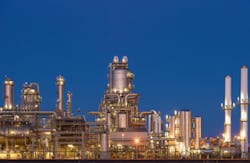Global petrochemical producers are facing fierce competition from U.S. companies that have been taking advantage of the huge amounts of natural gas available from their own oil and gas fields and used as feedstock for petrochemical production, Reuters reports.
In a bid to remain competitive, Asia’s biggest refiner, Sinopec Corp, previously known as China Petroleum and Chemical Corp, is trying to reduce its petrochemical production costs and to optimize its product portfolio. Sinopec hopes that the plan will allow it to withstand the challenge from U.S. manufacturers, which are currently looking to expand exports.
Low production prices and abundance of feedstock are attracting major investors to the U.S. petrochemical industry, eating away many of the growth opportunities for non-U.S. businesses in the sector, Wang Tianpu, Sinopec’s vice chairman and president, told the media while announcing the company’s results on Monday. Meanwhile, Sinopec’s own petrochemical production has been struggling because of its heavy dependence on naphtha as major feedstock
Naptha-free zones
Sinopec’s president also revealed that petrochemical manufacturers in the United States are benefiting from the opportunity to move away from naphtha and are investing significant capital into constructing facilities operating on ethane, produced from shale gas. Similarly, countries from the Middle East are also offering cheap supplies, especially to other Asian countries, which has been putting additional pressure on Chinese petrochemical producers in their attempts to find markets for their production, Wang stated. China is the biggest importer of petrochemical products in Asia and imports are threatening local petrochemical companies, Reuters noted.
RELATED: China takes first steps into shale gas development
Apart from developing plans to minimize the use of naphtha, the company is also working to offer more and more products with improved value propositions on the one hand, while investing in boosting its coal-to-chemical business, hoping to increase the competitiveness of its petrochemical business, on the other.
Affected by a drop in revenues, mainly from its upstream and chemical businesses, Sinopec reported that the net profits of the firm for 2012 plummeted 12.8 percent. The company’s operating profit for 2012 came in at just 367 million yuan ($59.1 million), compared to 25.3 billion yuan in 2011. However, the fall in revenues was not only caused by weakened performance by the company itself but could also be attributed to an overall economic slump in China, which caused product prices to fall dramatically, Wang said.
It was also announced that Sinopec has signed a two-year agreement with South Africa’s national oil company PetroSA, which brings the initiative known as Project Mthombo one step closer to realization. The $10 billion Mthombo project aims to create the biggest crude refinery in Africa, with a capacity of about 360,000 barrels a day.
The project is supposed to create 27,500 direct and indirect jobs at the height of its construction and about 18,000 jobs when it starts operating. Under the terms of the agreement, Sinopec will take part in the development and exploration processes of oil and gas fields not just in South Africa but also in neighboring countries.


